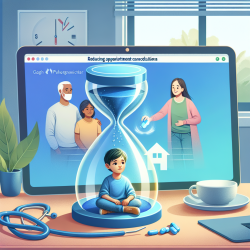Understanding the Challenges of Appointment Cancellations in ADHD
Attention-deficit/hyperactivity disorder (ADHD) is a prevalent neurodevelopmental disorder affecting children worldwide. A recent study titled "Cancellation of outpatient appointments in patients with attention-deficit/hyperactivity disorder" highlights a significant challenge: the high rate of appointment cancellations among children with ADHD compared to those with other psychiatric conditions. This blog post will delve into the findings of this study and explore strategies practitioners can implement to reduce cancellations and improve therapy outcomes.
Key Findings from the Research
The study conducted a systematic review of medical charts from the Shimada Ryoiku Medical Center for Challenged Children in Tokyo, Japan. It revealed that the cancellation rate for ADHD patients was 12.3%, significantly higher than the 5.6% and 5.3% for patients with pervasive developmental disorders (PDD) and developmental coordination disorders/communication disorders (DCD-CD), respectively. Notably, the use of osmotic-release oral system-methylphenidate (OROS-MPH) and antipsychotics was associated with fewer cancellations, suggesting a potential role for pharmacotherapy in improving appointment adherence.
Implications for Practitioners
For practitioners providing online therapy services, such as those at TinyEYE, these findings underscore the importance of addressing appointment adherence as part of the treatment plan for ADHD. Here are some strategies to consider:
- Pharmacotherapy: Encourage adherence to prescribed medications like OROS-MPH, which have been shown to reduce cancellation rates. Discuss with caregivers the importance of medication in managing ADHD symptoms and its potential impact on appointment adherence.
- Family Involvement: Given the potential genetic link in ADHD, involving family members in therapy sessions can be beneficial. Educate parents and caregivers about ADHD symptoms and strategies to manage them, as their inattentiveness might contribute to missed appointments.
- Reminder Systems: Implement robust reminder systems, such as automated calls, texts, or emails, to alert families of upcoming appointments. This can help mitigate forgetfulness and ensure better attendance.
- Flexible Scheduling: Offer flexible scheduling options to accommodate the varying needs of families. This can include virtual appointments or rescheduling options to prevent missed sessions.
Encouraging Further Research
While the study provides valuable insights, it also highlights areas for further research. Practitioners are encouraged to explore the following:
- Investigate the role of socioeconomic factors and parental ADHD symptoms in appointment adherence.
- Examine the effectiveness of different reminder systems and their impact on reducing cancellations.
- Explore the long-term effects of pharmacotherapy on appointment adherence and overall therapy outcomes.
Conclusion
Reducing appointment cancellations is crucial for improving therapy outcomes for children with ADHD. By implementing strategies informed by recent research, practitioners can enhance adherence and support better long-term outcomes for their patients. For those interested in a deeper dive into the study, the original research paper can be accessed here.










